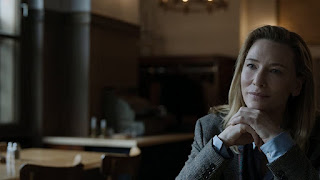“If you really want to talk about power and the long reach of history — the abuse and complicity of power, how it corrupts, all these clichés we’ve grown up with — you have to reckon with the idea that there is no black or white. To find the truth of something requires a little more rigor.” —Todd Field on the corruption of power in ''Tár"
Lydia Tár seems to acknowledge the risk of voiding her accolades if someone were to reveal her performative artistry—but she proceeds to manipulate her environment because she can’t help herself. In fact, it may even result in the ballooning of excessive narcissism and self-sabotage. Is this a feature of her real identity or does she miscalculate with her response to a crumbling empire to save her legacy? Where does her work as an artist stand in all this? The implications laid by the filmmakers for exploring this narrative are not to cast blame on any one individual, but rather to explore the shifting nature of power and those who wield it. Tár struggles to sleep at night and when she can finally shut her eyes, she’s susceptible to be swallowed whole by the ghosts of her past. In that regard, Tár reads like a chilling ghost story. When her mistakes inevitably halt her forward trajectory of power and fame, she begins a journey of self-discovery. This leads to her family on Staten Island, finally, where we might get an answer to who she was. As she enters her childhood home, the space starkly contrasts her modern aesthetic. She steps forward to a piano, only to learn that this pristine instrument is severely detuned. When her brother returns home, they share a brief moment where we learn that her real name is Linda Tarr.
Deciding that she can’t really ever recover from the accusations levied against her, she heads out of the country where she may be able to reconstruct the artist and person she desperately wished to portray. And the final scene, shrouded in the mystery of the spotlight, reveals that everything she built is gone by a beautiful track shot. It’s an ending that feels so devastating, regardless of your feelings about the character. Tár is a kind of ghost story, in which we’re so deeply embedded in Lydia Tár’s psyche that nearly everything that appears onscreen is up for debate. The ghost is that of Krista Taylor, Lydia’s former protégée, with whom Lydia is accused of sleeping and who was blackballed from conducting jobs through the emails Lydia deletes.
Even before Krista’s death by suicide, she haunts Lydia: We see her long red hair in the audience for Lydia’s conversation with Adam Gopnik. It’s also about the time Lydia starts hearing mysterious noises, some explicable (a medical device in a nearby apartment), some not. Who set her metronome a-ticking? And then comes the visit to the young cellist Olga’s grotty Berlin apartment building, where, she says, she’s staying with friends. Observed now by a gently drifting handheld camera, Lydia walks through the passageway and into a courtyard full of trash, where she hears, far away, a woman singing. We follow Lydia on her descent down the stairs, into a dripping, poorly lit underworld of unoccupied rooms. Where has Olga gone? What is this infernal place? Lydia flees, and face-plants at the top of the stairs. After her partner, Sharon, cleans up her face, Lydia gets up to comfort her daughter, Petra, in the middle of the night. And if you look closely, you’ll see, motionless in the dark corner of Lydia’s bedroom, nearly unnoticeable at the back of the frame, a red-haired woman: Krista. We are no longer watching a movie whose style is that of, as Slate’s Dana Stevens put it, “cool, keenly observed detachment.” The movie has swerved, in these scenes, into the uncanny. Are we seeing Lydia’s dreams? Her greatest fears? Her nerve disorder notalgia paraesthetica presents as a phantom itch, an “unreachable itch,” not unlike the memory of one’s own guilt, or a sound you can’t unhear.
It’s that right arm, Lydia tells Adam Gopnik at the film’s beginning, that marks time. “Right from the first moment, I know exactly what time it is,” she says, with supreme confidence, “and the exact moment that you and I will arrive at our destination together.” In the film’s final act, Lydia loses her confident control over time, and a film that was up till now conducted at adagietto, like the slow movement of Mahler’s Fifth, picks up. A video of a charged encounter at Juilliard goes viral, oddly edited from multiple perspectives, even though no one in that rehearsal room seemed to have a phone out. A story in the New York Post accuses her of grooming multiple young women. Her performance score for Mahler’s Fifth disappears without explanation. She loses the support of her foundation, and her access to a private jet.
We are in Lydia Tár’s point of view now, in her subjective space, and all is unraveling with shocking speed, including possibly her mind. Protesters picket her poorly attended reading in New York. Olga abandons her at her hotel for someone more fun. Sharon kicks her out and withholds their daughter. She loses her position, loses her chance at the Fifth. Vivace. Tár isn’t a puzzle box, where the answer clicks into place at the end and we understand, at last, who Keyser Söze was. Think of this film, instead, as a journey through a haunted forest, like the ones the Grimms wrote about—like the one where Lydia hears that scream. We wend our way down ever-darker paths, becoming less and less certain what is real and what is not. By presenting the reality of Tár as increasingly subjective, Field is demanding that we question everything we see on that big screen, and receive the film as a mix of plot and psychology, incident and nightmare—all coming back around to the life, the dreams, and the fears of the incomparable Lydia Tár. Source: slate.com
Human mental life is constituted by a division between the subject and the object, and our other antinomical worldviews spring from this original antinomy. Often, the psychological analyses are punctuated by discussions of Kierkegaard and Friedrich Nietzsche – in particular, Kierkegaard’s stress on the choice that each individual must make and commit to. Karl Jaspers introduces one of his most influential ideas – that of boundary or limit situations (‘Grenzsituationen’). These are situations in which the subject experiences dread, guilt and anxiety, where we experience a lack of unity and stability: ‘everything is fluid, is in the restless movement of being in question, everything is relative, finite, split into opposites, never whole, absolute, essential,’ as Jaspers put it. Although a negative experience, these situations allow the human consciousness to confront its limits and restrictions.
Yet while his colleague Max Weber predicted an ideologically fractured and disenchanted world, Jaspers translated this pessimism into a sense of tragedy that affirms the force of reason and justice in history. ‘Truth is what really unites us,’ he wrote. Philosophically, Jaspers is most renowned for his philosophy of existence, or ‘Existenzphilosophie’, which is laid out in his three-volume work Philosophie (1932). We may feel we are subjects who have an infinite capacity, who feel boundless but, when hemmed in by guilt, suffering and death, we come up decisively against the finite reality of our existence. In these situations, we have to act. We either transcend these situations or not. We can cement ourselves further in ‘Dasein’ (mere existence) or transcend into ‘Existenz’. After all, we cannot escape the world nor should be want to and, Jaspers wrote: ‘I really love transcendence only as my love transfigures the world.’ For Jaspers, that focus beyond the world is what is of value – remaining in the world, and reaching only towards the world, broken and imperfect as it and we are, perhaps does more frequently lead to failure and shipwreck. Source: aeon.co





















No comments :
Post a Comment